外研版九年级下册Module 1 Travel Unit 1课件+音频(共60张PPT)
文档属性
| 名称 | 外研版九年级下册Module 1 Travel Unit 1课件+音频(共60张PPT) |  | |
| 格式 | pptx | ||
| 文件大小 | 27.2MB | ||
| 资源类型 | 教案 | ||
| 版本资源 | 外研版 | ||
| 科目 | 英语 | ||
| 更新时间 | 2024-08-29 09:20:23 | ||
图片预览


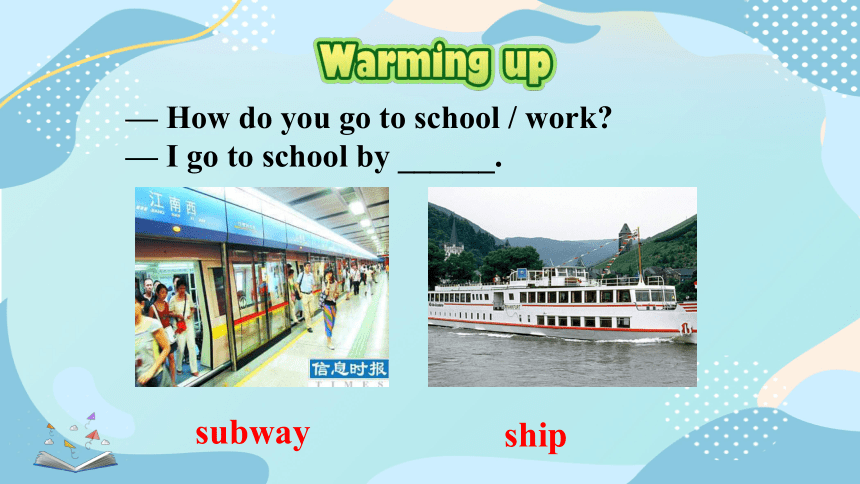

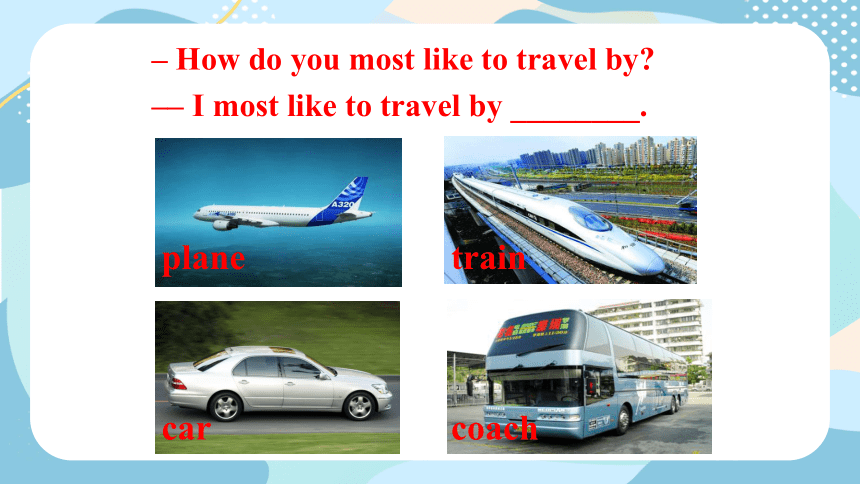

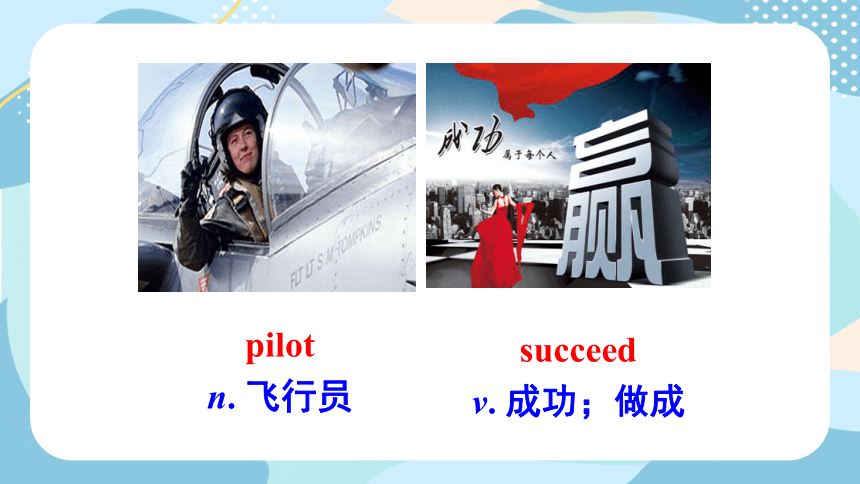
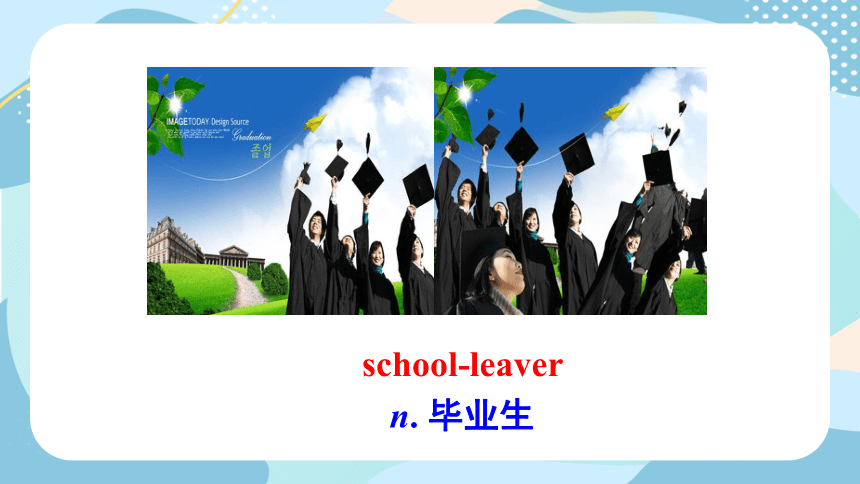

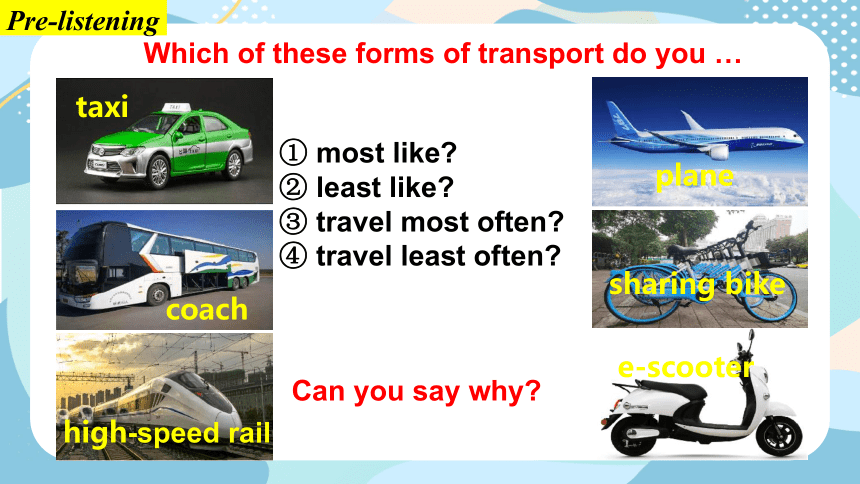
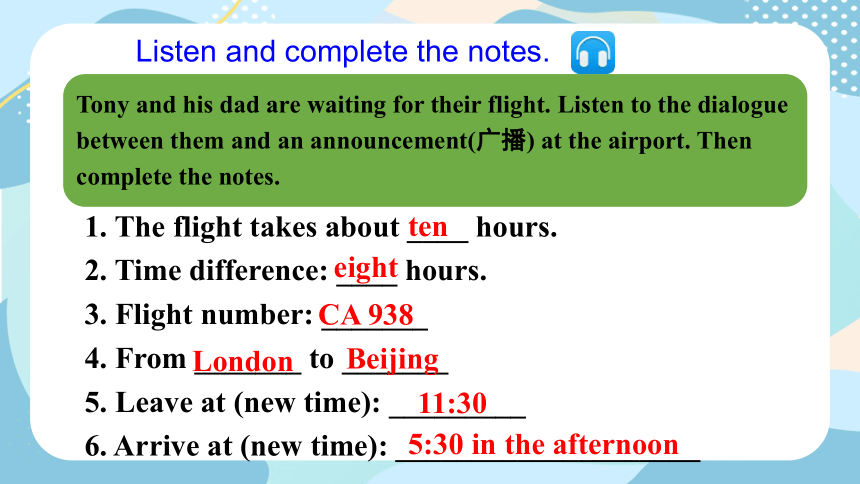

文档简介
(共60张PPT)
外研版 九年级下册
Module 1
Unit 1
We toured the city by bus and by taxi.
Travel
To be able to understand the conversation about travel
To be able to talk about one’s holiday
— How do you go to school / work
— I go to school by ______.
subway
ship
taxi
train
bike
bus
– How do you most like to travel by
–– I most like to travel by ________.
plane
train
car
coach
flight
n. 航班;飞行
pilot
n. 飞行员
succeed
v. 成功;做成
school-leaver
n. 毕业生
Words and expressions
flight
because of
direct
pilot
succeed
as long as
school-leaver
exactly
n. 航班;飞行
因为;由于
adv. 径直地;直接地
n. 飞行员
v. 成功;做成
只要
n. 毕业生
adv.确切地;完全;
(表赞同)确实如此
Which of these forms of transport do you …
① most like
② least like
③ travel most often
④ travel least often
taxi
coach
high-speed rail
Can you say why
plane
sharing bike
e-scooter
Pre-listening
1. The flight takes about ____ hours.
2. Time difference: ____ hours.
3. Flight number: _______
4. From _______ to _______
5. Leave at (new time): _________
6. Arrive at (new time): ____________________
Listen and complete the notes.
ten
eight
CA 938
London
Beijing
11:30
5:30 in the afternoon
Tony and his dad are waiting for their flight. Listen to the dialogue between them and an announcement(广播) at the airport. Then complete the notes.
Listen again and answer the following questions.
1. When did they check in at the airport
At nearly 8 o’clock.
2. How long will the plane be late
Three hours late.
Lingling,Daming and Betty are talking
about their holiday activities.
While-listening
Task 1
What are they talking about?
Lingling went to see her grandparents in Henan province by train. The train was full of people, and she had to stand for over three hours.
Read along with the tape and fill in the blanks.
Task 2
It’s the busiest season in China because of the Spring Festival.
Tony went to stay with his family in the UK. He’s flying back today.
Daming flew direct to Hong Kong – and the plane left a bit late too! He took a boat to Lantau Island and went to Disneyland.
Betty toured the city by bus and by taxi. She took a tour by coach to the Summer Palace and went for a long walk around the lake.
Answer the questions.
Task 3
1. When do you think the conversation
takes place
When they get back to school after the winter holidays./At the beginning of the term.
2. According to Lingling, why is travel so difficult in winter
3. What are Daming and Betty looking forward toat the end of the term
They are looking forward to the school-leavers’ party at the end of the term.
It’s the busiest season in China because of the Spring Festival.
Now complete the table.
Holiday activities
Lingling went to see her grandparents in Henan Province by train
Tony
went to stay with his family in the UK.
Holiday activities
Daming
Betty
flew direct to Hong Kong and took a boat to Lantau Island and went to Disneyland.
toured the city by bus and by taxi, took a tour by coach to the Summer Palace and went for a long walk around the lake.
Choose the correct answer.
direct exactly pilot succeed
1. When you fly direct, you ______.
a) arrive without stopping at another
place
b) stop at another place before you
arrive
2. When you say “Exactly”, it means ___.
a) you do not agree
b) you completely agree
3. The pilot of plane ______ .
a) flies it
b) gives you food and drink during
the flight
4. If you succeed in doing something, you ______.
a) manage to do it b) nearly do it
Read and try to recite the conversation in 5-10 minutes.
Think over
How to make your travel (by bus, train or plane) better
Avoid the busy season;
Set off early;
Choose the place with a similar view of the famous beauty spot, rather than itself;
Make a plan for your travel several months before you set off;
Book tickets online …
Post-listening
Pronunciation and speaking
Lingling: How about you, Betty
Betty: We had quite a good time in
Beijing. We toured the city by
bus and by taxi. Last weekend,
we took a tour by coach to the
Summer Palace and went for
a long walk around the lake.
Listen and mark the pauses.
Lingling: That sounds great! But now, we’d better get back to work. We’re going to have a big exam at the end of the term.
Now listen and repeat.
“断句”在英语表达中很重要。一些长的句子需要按照意思的群落(即“意群”)适当断开、稍加停顿(即“停顿”),断开的几部分都具有相对完整的意思。按照一般语法结构,可划分为以下意群单位:
(1)短句 (2)名词短语
(3)介词/不定式/分词短语
(4)动词短语 (5)主谓结构
(6)动宾结构 (7)系表结构
(8)动状结构 (9)主句-从句。
Ask and answer about what you did during the winter holiday.
–What did you do during the winter holiday
– I went to see my grandparents in Xi’an.
Talk about your winter holiday.
Where did you go
What did you do there
Who did you go with
Was the journey easy or difficult
Was the journey long or short
What sort of clothes did you need
Did you like it there Was it fun
Some questions such as:
Talk about what happened during the trip.
The train was full of people and I had to stand for three hours!
Not bad!
It was great fun!
How about you
We’d better get back to work.
We’ll have a great time!
You may use these everyday English
What’s your ideal winter holiday
Where would you go
What would you do
Who would you go with
adj. 理想的
Language points
1. Well, it’s the busiest season in China because of the Spring Festival.
噢,因为春节的缘故,这段时间成了交通最繁忙的时候。
because of 因为,由于
e.g. Wendy was late for school today because of the heavy snow. Wendy今天因为大雪上学迟到了。
because 和 because of
词条 相同点 不同点
because 都可表示原因,意为“因为”。 是连词,引导原因状语从句。because +句子可以直接回答以why开头的特殊疑问句。
because of 是短语介词,其后常接名词、代词或v.-ing形式。
含有because和because of 的句子有时候可以互相转换。
e.g. Tom didn’t go to school because he was ill. =
Tom didn’t go to school because of his illness.
【语境应用】根据句意选用because或because of填空。
1) Kate was late for work ____________ she missed the early bus.
2) I didn’t go to the zoo ____________ the hot weather.
3) —Why didn’t Mike write to Alice last month
—____________ he was very busy.
4) Ted came to this city ____________ you.
because
because of
Because
because of
2. But the pilot succeeded in landing on time.
不过飞行员成功地按时着陆了。
succeed v. 成功;做成,常用于succeed in sth.或succeed in doing sth.结构中。
e.g. 很少有人减肥成功。(翻译)
Very few people succeed in losing weight.
I hope you will succeed in your studies.
我希望你能在学业上取得成功。
★success 作“成功、成就”讲时,是不可数名词;
作“成功的人(或事物)”讲时,是可数名词。
e.g. He has had great success.
His new book was a great success.
★successful adj. 成功的,在句中作定语或表语。
e.g. He wants to be a successful writer.
I’m sure you will be successful.
【语境应用】词汇运用。
1) I hope that you will __________(success) in winning the running competition.
2) The secret of _______(succeed) is hard work.
3) He is a __________(success) writer. His books are popular among young people.
succeed
success
successful
3. There’s nothing to worry about as long as you work hard.
只要你努力学习,没什么好担心的。
as long as 只要……,与so long as意思相同,引导条件状语从句。
e.g. I’ll follow you as long as you make a decision.
只要你决定了,我就跟你干。
【语境应用】根据汉语意思完成英语句子,每空一词。
只要你去参加聚会,我也去。
As long as ________ ________ ________the party, I’ll go too.
you go to
Grammar
名词
名词有可数与不可数之分,有数和所有格的变化,在句中可以作主语、宾语、宾语补足语、表语、同位语等。
1. 可数名词与不可数名词
很多情况下,我们可以依靠常识(即用
数数的办法)来判断英语名词是否可数。
比如,book, table 都是可数名词而water是不可数名词。一般来说,在英语中物质名词和抽象名词都是不可数名词,如flour, rice, beauty, pleasure, money等。
学习名词必须区分其是否可数。只有可数名词前才可以使用数词和不定冠词。值得注意的是,有时同一个单词所指不同,其数的概念也就不同。
例如,paper作 “纸” 解时为不可数名词,表示 “报纸” 和 “试卷” 时是可数名词;fish 指 “鱼肉” 时是不可数名词,表示“鱼”时是可数名词,只不过通常是单复数同形;coffee做 “咖啡” 解时是不可数名词,表示 “一杯咖啡” 时是可数名词。
2. 名词的数
对于可数名词数的变化,
一要掌握规则变化,即名词后面加-s或者-es的情况;
二要掌握不规则变化,包括
man-men, woman-women, foot-feet,
tooth-teeth, mouse-mice, child-
children等;
三要掌握单复数同形的单词,如sheep等。除此之外,还应注意以下几点:
I.可数名词变复数
1.规则变化
(1) 一般在词尾加 s如
book—books, boy—boys
(2) 以s, x, sh, ch结尾的名词加 es ( 但stomach在词尾加 s)。 如: bus—buses, watch—watches
(3)以辅音字母+y结尾的名词,变y为i,再加 es。如: factory—factories, party—parties
(4) 以o结尾的名词,除有生命的“两人两物(Negro, hero, tomato, potato,volcano )”在后面加 es外,(特例:kangroos,mangos/mangoes)一般在后面直接加 s。如:zoo—zoos, radio—radios, piano—pianos(
(5) 以th结尾的多数加s,mouths,months
(6)以f或fe结尾的词,变f或fe为v, 再加 es。 如: knife—knives, shelf—shelves, thief—thieves
2.不规则变化
(1)单、复数同形的词。如:
sheep, fish, Chinese, Japanese,deer
(2)词干发生变化的词。如:
foot—feet, tooth—teeth,
child—children, mouse—mice, goose—geese
II. 在一般情况下,复合名词的单复数
形式体现在最后一个名词上,如
a pencil box–pencil boxes, a girl student–girl students。
但是如果是由man或woman构成的复合名词,
如a man doctor, a woman teacher,
其复数形式则为men doctors, women teachers。
III. 有些名词往往以复数形式出现,如
trousers, glasses(眼镜),在表示数量时需要借助量词,如a pair of trousers, three pairs of trousers。
IV. 有些名词表示复数概念,往往作为一个整体看待,如police, people。
这些单词没有复数形式,但是其后面的谓语动词却多为复数形式。
例如:The police have caught the thief. Many people have seen the film.
如果要表达单个数量只能换用其他单词。
例如:“一名警察” 是 a policeman /policeman, “一个人” 可以是 a person, a man, a woman等。
不过要注意,people作 “民族,种族” 解时,是可数名词,复数形式是peoples。
3. 名词的所有格
名词的所有格一般采用名词后加’s的形式,如a child’s dream, someone’s bag;以- s结尾的复数名词的所有格
直接加 ’即可,如the boys’ schoolbags。所有格表示的是所属关系,采用’s结构的多为有生命的名词。如果是无生
命的名词,多采用 “of+名词” 的方式表达。例如:
the window of the house 房子的窗户
the end of the year 年末
the gate of our school 我们学校的大门
注意:双重所有格
双重所有格指同时使用's 所有格和of 所有格。a friend of my father’s 与my father’s friend的含义不同,前者含有“我父亲有不止一个朋友”的意思,而后者没有这一含义。
我的一个朋友 a friend of mine
4. 名词的句法功能
名词的句法功能指名词可以充当的句
子成分,常见的有:
(1)主语
The flight takes about thirteen hours.
航程需要大约13个小时。
Mr Wang teaches us English.
王老师教我们英语。
(2)宾语
Many people were helping the old
man when I passed.
我路过的时候,许多人在帮助这位老人。
He has become very interested in chess recently.
最近他对国际象棋产生了很大的兴趣。
(3) 宾语补足语
We all call him Xiao Li.
我们都叫他小李。
(4) 表语
My younger brother is a policeman.
我弟弟是警察。
名词还可以用作同位语、呼语等。如:Mr Wang, my neighbour, has bought a new car.
我的邻居王先生买了辆新车。(my neighbour是Mr Wang的同位语)
Tom, come and play games with us.
汤姆,来和我们玩游戏吧。(是呼语)
Summary
重点短语:
No bad! be full of because of on time
How was your holiday
重点语法:
名词单复数
名词所有格
Write a passage about your last holiday.
What did you do during your holiday
Where did you go
What happened
What are you looking forward to
Thank you
外研版 九年级下册
Module 1
Unit 1
We toured the city by bus and by taxi.
Travel
To be able to understand the conversation about travel
To be able to talk about one’s holiday
— How do you go to school / work
— I go to school by ______.
subway
ship
taxi
train
bike
bus
– How do you most like to travel by
–– I most like to travel by ________.
plane
train
car
coach
flight
n. 航班;飞行
pilot
n. 飞行员
succeed
v. 成功;做成
school-leaver
n. 毕业生
Words and expressions
flight
because of
direct
pilot
succeed
as long as
school-leaver
exactly
n. 航班;飞行
因为;由于
adv. 径直地;直接地
n. 飞行员
v. 成功;做成
只要
n. 毕业生
adv.确切地;完全;
(表赞同)确实如此
Which of these forms of transport do you …
① most like
② least like
③ travel most often
④ travel least often
taxi
coach
high-speed rail
Can you say why
plane
sharing bike
e-scooter
Pre-listening
1. The flight takes about ____ hours.
2. Time difference: ____ hours.
3. Flight number: _______
4. From _______ to _______
5. Leave at (new time): _________
6. Arrive at (new time): ____________________
Listen and complete the notes.
ten
eight
CA 938
London
Beijing
11:30
5:30 in the afternoon
Tony and his dad are waiting for their flight. Listen to the dialogue between them and an announcement(广播) at the airport. Then complete the notes.
Listen again and answer the following questions.
1. When did they check in at the airport
At nearly 8 o’clock.
2. How long will the plane be late
Three hours late.
Lingling,Daming and Betty are talking
about their holiday activities.
While-listening
Task 1
What are they talking about?
Lingling went to see her grandparents in Henan province by train. The train was full of people, and she had to stand for over three hours.
Read along with the tape and fill in the blanks.
Task 2
It’s the busiest season in China because of the Spring Festival.
Tony went to stay with his family in the UK. He’s flying back today.
Daming flew direct to Hong Kong – and the plane left a bit late too! He took a boat to Lantau Island and went to Disneyland.
Betty toured the city by bus and by taxi. She took a tour by coach to the Summer Palace and went for a long walk around the lake.
Answer the questions.
Task 3
1. When do you think the conversation
takes place
When they get back to school after the winter holidays./At the beginning of the term.
2. According to Lingling, why is travel so difficult in winter
3. What are Daming and Betty looking forward toat the end of the term
They are looking forward to the school-leavers’ party at the end of the term.
It’s the busiest season in China because of the Spring Festival.
Now complete the table.
Holiday activities
Lingling went to see her grandparents in Henan Province by train
Tony
went to stay with his family in the UK.
Holiday activities
Daming
Betty
flew direct to Hong Kong and took a boat to Lantau Island and went to Disneyland.
toured the city by bus and by taxi, took a tour by coach to the Summer Palace and went for a long walk around the lake.
Choose the correct answer.
direct exactly pilot succeed
1. When you fly direct, you ______.
a) arrive without stopping at another
place
b) stop at another place before you
arrive
2. When you say “Exactly”, it means ___.
a) you do not agree
b) you completely agree
3. The pilot of plane ______ .
a) flies it
b) gives you food and drink during
the flight
4. If you succeed in doing something, you ______.
a) manage to do it b) nearly do it
Read and try to recite the conversation in 5-10 minutes.
Think over
How to make your travel (by bus, train or plane) better
Avoid the busy season;
Set off early;
Choose the place with a similar view of the famous beauty spot, rather than itself;
Make a plan for your travel several months before you set off;
Book tickets online …
Post-listening
Pronunciation and speaking
Lingling: How about you, Betty
Betty: We had quite a good time in
Beijing. We toured the city by
bus and by taxi. Last weekend,
we took a tour by coach to the
Summer Palace and went for
a long walk around the lake.
Listen and mark the pauses.
Lingling: That sounds great! But now, we’d better get back to work. We’re going to have a big exam at the end of the term.
Now listen and repeat.
“断句”在英语表达中很重要。一些长的句子需要按照意思的群落(即“意群”)适当断开、稍加停顿(即“停顿”),断开的几部分都具有相对完整的意思。按照一般语法结构,可划分为以下意群单位:
(1)短句 (2)名词短语
(3)介词/不定式/分词短语
(4)动词短语 (5)主谓结构
(6)动宾结构 (7)系表结构
(8)动状结构 (9)主句-从句。
Ask and answer about what you did during the winter holiday.
–What did you do during the winter holiday
– I went to see my grandparents in Xi’an.
Talk about your winter holiday.
Where did you go
What did you do there
Who did you go with
Was the journey easy or difficult
Was the journey long or short
What sort of clothes did you need
Did you like it there Was it fun
Some questions such as:
Talk about what happened during the trip.
The train was full of people and I had to stand for three hours!
Not bad!
It was great fun!
How about you
We’d better get back to work.
We’ll have a great time!
You may use these everyday English
What’s your ideal winter holiday
Where would you go
What would you do
Who would you go with
adj. 理想的
Language points
1. Well, it’s the busiest season in China because of the Spring Festival.
噢,因为春节的缘故,这段时间成了交通最繁忙的时候。
because of 因为,由于
e.g. Wendy was late for school today because of the heavy snow. Wendy今天因为大雪上学迟到了。
because 和 because of
词条 相同点 不同点
because 都可表示原因,意为“因为”。 是连词,引导原因状语从句。because +句子可以直接回答以why开头的特殊疑问句。
because of 是短语介词,其后常接名词、代词或v.-ing形式。
含有because和because of 的句子有时候可以互相转换。
e.g. Tom didn’t go to school because he was ill. =
Tom didn’t go to school because of his illness.
【语境应用】根据句意选用because或because of填空。
1) Kate was late for work ____________ she missed the early bus.
2) I didn’t go to the zoo ____________ the hot weather.
3) —Why didn’t Mike write to Alice last month
—____________ he was very busy.
4) Ted came to this city ____________ you.
because
because of
Because
because of
2. But the pilot succeeded in landing on time.
不过飞行员成功地按时着陆了。
succeed v. 成功;做成,常用于succeed in sth.或succeed in doing sth.结构中。
e.g. 很少有人减肥成功。(翻译)
Very few people succeed in losing weight.
I hope you will succeed in your studies.
我希望你能在学业上取得成功。
★success 作“成功、成就”讲时,是不可数名词;
作“成功的人(或事物)”讲时,是可数名词。
e.g. He has had great success.
His new book was a great success.
★successful adj. 成功的,在句中作定语或表语。
e.g. He wants to be a successful writer.
I’m sure you will be successful.
【语境应用】词汇运用。
1) I hope that you will __________(success) in winning the running competition.
2) The secret of _______(succeed) is hard work.
3) He is a __________(success) writer. His books are popular among young people.
succeed
success
successful
3. There’s nothing to worry about as long as you work hard.
只要你努力学习,没什么好担心的。
as long as 只要……,与so long as意思相同,引导条件状语从句。
e.g. I’ll follow you as long as you make a decision.
只要你决定了,我就跟你干。
【语境应用】根据汉语意思完成英语句子,每空一词。
只要你去参加聚会,我也去。
As long as ________ ________ ________the party, I’ll go too.
you go to
Grammar
名词
名词有可数与不可数之分,有数和所有格的变化,在句中可以作主语、宾语、宾语补足语、表语、同位语等。
1. 可数名词与不可数名词
很多情况下,我们可以依靠常识(即用
数数的办法)来判断英语名词是否可数。
比如,book, table 都是可数名词而water是不可数名词。一般来说,在英语中物质名词和抽象名词都是不可数名词,如flour, rice, beauty, pleasure, money等。
学习名词必须区分其是否可数。只有可数名词前才可以使用数词和不定冠词。值得注意的是,有时同一个单词所指不同,其数的概念也就不同。
例如,paper作 “纸” 解时为不可数名词,表示 “报纸” 和 “试卷” 时是可数名词;fish 指 “鱼肉” 时是不可数名词,表示“鱼”时是可数名词,只不过通常是单复数同形;coffee做 “咖啡” 解时是不可数名词,表示 “一杯咖啡” 时是可数名词。
2. 名词的数
对于可数名词数的变化,
一要掌握规则变化,即名词后面加-s或者-es的情况;
二要掌握不规则变化,包括
man-men, woman-women, foot-feet,
tooth-teeth, mouse-mice, child-
children等;
三要掌握单复数同形的单词,如sheep等。除此之外,还应注意以下几点:
I.可数名词变复数
1.规则变化
(1) 一般在词尾加 s如
book—books, boy—boys
(2) 以s, x, sh, ch结尾的名词加 es ( 但stomach在词尾加 s)。 如: bus—buses, watch—watches
(3)以辅音字母+y结尾的名词,变y为i,再加 es。如: factory—factories, party—parties
(4) 以o结尾的名词,除有生命的“两人两物(Negro, hero, tomato, potato,volcano )”在后面加 es外,(特例:kangroos,mangos/mangoes)一般在后面直接加 s。如:zoo—zoos, radio—radios, piano—pianos(
(5) 以th结尾的多数加s,mouths,months
(6)以f或fe结尾的词,变f或fe为v, 再加 es。 如: knife—knives, shelf—shelves, thief—thieves
2.不规则变化
(1)单、复数同形的词。如:
sheep, fish, Chinese, Japanese,deer
(2)词干发生变化的词。如:
foot—feet, tooth—teeth,
child—children, mouse—mice, goose—geese
II. 在一般情况下,复合名词的单复数
形式体现在最后一个名词上,如
a pencil box–pencil boxes, a girl student–girl students。
但是如果是由man或woman构成的复合名词,
如a man doctor, a woman teacher,
其复数形式则为men doctors, women teachers。
III. 有些名词往往以复数形式出现,如
trousers, glasses(眼镜),在表示数量时需要借助量词,如a pair of trousers, three pairs of trousers。
IV. 有些名词表示复数概念,往往作为一个整体看待,如police, people。
这些单词没有复数形式,但是其后面的谓语动词却多为复数形式。
例如:The police have caught the thief. Many people have seen the film.
如果要表达单个数量只能换用其他单词。
例如:“一名警察” 是 a policeman /policeman, “一个人” 可以是 a person, a man, a woman等。
不过要注意,people作 “民族,种族” 解时,是可数名词,复数形式是peoples。
3. 名词的所有格
名词的所有格一般采用名词后加’s的形式,如a child’s dream, someone’s bag;以- s结尾的复数名词的所有格
直接加 ’即可,如the boys’ schoolbags。所有格表示的是所属关系,采用’s结构的多为有生命的名词。如果是无生
命的名词,多采用 “of+名词” 的方式表达。例如:
the window of the house 房子的窗户
the end of the year 年末
the gate of our school 我们学校的大门
注意:双重所有格
双重所有格指同时使用's 所有格和of 所有格。a friend of my father’s 与my father’s friend的含义不同,前者含有“我父亲有不止一个朋友”的意思,而后者没有这一含义。
我的一个朋友 a friend of mine
4. 名词的句法功能
名词的句法功能指名词可以充当的句
子成分,常见的有:
(1)主语
The flight takes about thirteen hours.
航程需要大约13个小时。
Mr Wang teaches us English.
王老师教我们英语。
(2)宾语
Many people were helping the old
man when I passed.
我路过的时候,许多人在帮助这位老人。
He has become very interested in chess recently.
最近他对国际象棋产生了很大的兴趣。
(3) 宾语补足语
We all call him Xiao Li.
我们都叫他小李。
(4) 表语
My younger brother is a policeman.
我弟弟是警察。
名词还可以用作同位语、呼语等。如:Mr Wang, my neighbour, has bought a new car.
我的邻居王先生买了辆新车。(my neighbour是Mr Wang的同位语)
Tom, come and play games with us.
汤姆,来和我们玩游戏吧。(是呼语)
Summary
重点短语:
No bad! be full of because of on time
How was your holiday
重点语法:
名词单复数
名词所有格
Write a passage about your last holiday.
What did you do during your holiday
Where did you go
What happened
What are you looking forward to
Thank you
同课章节目录
- Module 1 Travel
- Unit 1 We toured the city by bus and by taxi
- Unit 2 It's a long story.
- Unit 3 Language in use
- Module 2 Education
- Unit 1 They don't sit in rows.
- Unit 2 What do I like best about school?
- Unit 3 Language in use
- Module 3 Life now and then
- Unit 1 They sometimes work harder.
- Unit 2 I think life is better today.
- Unit 3 Language in use.
- Module 4 Rules and suggestions
- Unit 1 You must be careful of falling stones.
- Unit 2 we must keep the camp clean.
- Unit 3 Language in use.
- Revison A
- Module 5 Look after yourself
- Unit 1 We'd better get you to hospital.
- Unit 2 Get off the sofa!
- Unit 3 Language in use.
- Module 6 Eating togethe
- Unit 1 When is the school-leavers' party?
- Unit 2 Knives and forks are used for most Western
- Unit 3 Language in use
- Module 7 English for you and me
- Unit 1 Have you ever been to an English corner?
- Unit 2 We all own English.
- Unit 3 Language in use
- Module 8 My future life
- Unit 1 Here's to our friendship and the future
- Unit 2 I know that you will be better at maths.
- Unit 3 Language in use
- Revison B
